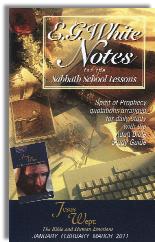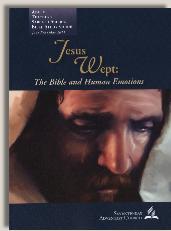|
||||||||||||||
Commentary on "Good Thinking"
Day 1: Sabbath Afternoon, January 29, 2011 - Introduction
Overview
This week’s lesson brings a very strong therapeutic approach to Christian living. The author hopes to provide the reader with the tools for developing the healthy thought patterns that will bring positive behaviors and feelings. Cognitive Behavior Therapy (CBT) is promoted as a method that is very compatible with the Bible’s teachings on overcoming sin. Unhealthy behaviors and feelings begin with unhealthy thoughts. By learning to depend on God’s help, we can control our thoughts and the behaviors that spring from our minds, and become more Christ like.
Observations
In the Lesson’s blend of CBT and Christianity, we are presented with a method of divinely-assisted self-therapy. It assumes that dysfunctional thoughts lie at the root of undesirable behavior (sin), and these thoughts lead to sinful behaviors. Therefore, if we can gain control of our thoughts, by God’s help of course, we will gain victory over sin. Spiritual growth mirrors the process and goals of cognitive psychotherapy. The goal of treatment is to develop control of one’s mind, promoting healthy thoughts, resulting in healthy spiritual living.
According to the National Association of Cognitive Behavior Therapy, CBT has its earliest roots in Stoic philosophy from ancient Greece (National Association of Cognitive- Behavioral Therapists, http://www.nacbt.org/whatiscbt.htm). The Stoics taught that we are happiest when we live in conformity to nature instead of fighting it and complaining about its difficulties. They believed that the way of virtue was through developing a strong character governed by reason, for reason was the divine principle of the universe. Today, those who practice the skills of CBT are also attempting to live in conformity with Nature through their powers of reason.
The apostle Paul was quite familiar with the philosophy of Stoicism, and when he met them in Athens, he refuted them (Acts 17:22-31). In his letter to the Romans, he destroys the very foundation of Stoic thinking. The reasoning human mind is depraved, Paul says, and no matter how well he uses his reason to find peace and harmony, he rebels against God’s rule and worships the creature instead. Man refuses to see how God’s eternal power and divine attributes are clearly seen in nature (Rom. 1:20) because his mind is naturally hostile to God. The natural man cannot submit to Him (Rom. 8:7). This rebellion is the very root of sin, and it makes a mockery of any attempt to think our way out of sin. Sin is not merely dysfunctional habits of thought or a poorly disciplined mind. Sin is the God-hating principle operating in our deepest self, and it shapes all of our finest reasoning. Our thoughts are not the root cause of sins, for Sin corrupts the root of even our best thinking. This law of the flesh remains true as long as we live in this body.
This week we will examine the therapeutic sanctification that is promoted in this lesson, and compare it to the mind that has died in Christ and risen to walk in the Spirit.
Summary
- The cognitive behavior therapy promoted in the Lesson derives from Stoic philosophy.
- The New Testament has refuted the Stoic way of life and demonstrated that the human mind uses its powers of reason to express its rebellion against God.
- Our thoughts are not the root cause of sin, for sin is the rebellious principle ruling our flesh which produces our corrupt thinking.
- Dying with Christ and walking in the Spirit are radically different than the Stoic sanctification taught in the Lesson.
Copyright 2011 BibleStudiesForAdventists.com. All rights reserved. Revised February 1, 2011. This website is published by Life Assurance Ministries, Camp Verde, Arizona, USA, the publisher of Proclamation! Magazine. Contact email: BibleStudiesForAdventists@gmail.com.
The Sabbath School Bible Study Guide and the corresponding E.G. White Notes are published by Pacific Press Publishing Association, which is owned and operated by the Seventh-day Adventist church. The current quarter's editions are pictured above.
Official Adventist Resources
Standard Edition Study Guide Week 6
Teacher's Edition Study Guide Week 6


